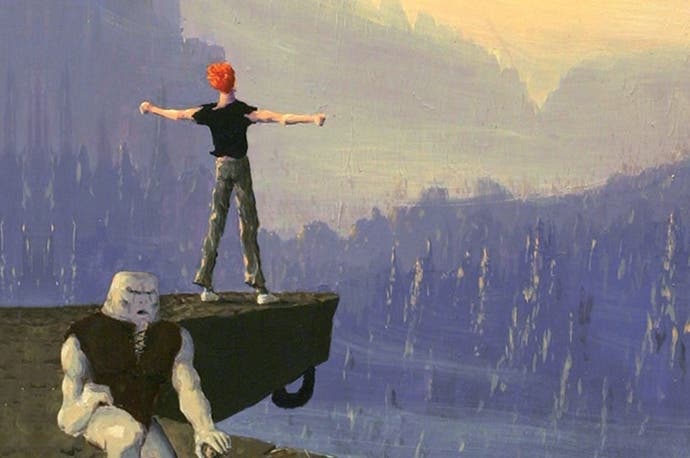Another World: the eccentricities of Eric Chahi
From Dust to beyond, the return of a video game legend.
I get the impression that Eric Chahi can never sit still for too long. Speaking to the veteran games designer from his flat in France over Skype, there's an energy that's bursting out of the little video window on my MacBook, his head dancing this way and that as he gets caught up in his own enthusiasm and occasionally sidetracked by his own thoughts. Listening to the audio a short while after to transcribe it all, I can hear Chahi's smile throughout.
Chahi's not sticking around, either. The day after our chat he's heading out to the island of Réunion, an overseas region of France in the Indian Ocean that's just east of Madagascar. It's where he is right now, in fact, observing Piton de la Fournaise, an active volcano that's been erupting for some 60 days now. It's not exactly my idea of a holiday. Chahi, though, loves volcanoes. You might have got a sense of that if you played From Dust, his last commercially released effort, which rendered Chahi's fascination with volcanology in brilliantly malleable, playable form. He explains why volcanoes are so fascinating.
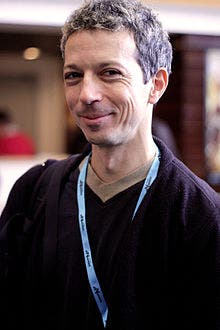
"Because it is the earth in motion," says Chahi, his French accent imbuing his already lofty words with a dash more poetry. "It's the birth of the earth in a way. It's beautiful, it's powerful and it's dynamic." There's a short pause while he gathers a pocketful more thoughts. "It puts you in a relative place to the earth. It's like thinking of a billion stars or galaxies. There's the same vertigo."
Such things great video games are built upon. When From Dust launched in 2011 it marked a return, of sorts, for this designer who's always been something of an outsider after 13 years away. "I'm a bit eccentric!" Chahi says with humble pride. "I'm not going to GDC every year, I'm not playing every game that's out. I love games, and I love creating games, but because I love many other things I don't focus as much as maybe other developers." He's a man of many interests, in other words, and someone who's not afraid to indulge them - hence From Dust folding in a love of geology as well as the surrealism of Polish painter Zdislaw Beksinski and the humbling everythingness of Godfrey Reggio's film poem Koyaanisqatsi.
Chahi has excelled in bringing his outside influences to bear on his work before, and he's combined it with the same playful curiosity that led him into video games. "I was a real arcade enthusiast. I wanted to do it myself - I just wanted to create arcade games. When the teacher asked me what I wanted to do in the future, I said electronics or creating an arcade game. With the rise of the PC, it made me realise that you could create games in your home with just a computer. There's no need to know electronics. Just code. It was a revelation. And the exciting thing is that you can master something that's alive without you. That's fascinating! You can put some logic and the things react, depending on what you put into the logic, and make some picture in motion. That was extraordinary."
Working on an Oric Atmos, Chahi created his first game over the summer holidays when he was 16, and soon got encouragement to take his hobby further. "A friend of my parents, they said I should go to the importer of this computer and show them these two games and ask if they're interested. I wrote with my parents, and they said yes, they're very interested, they could give me some hardware or some money, what do you want Eric?" So, what did young Eric go for? "Hardware!" Chahi exclaims with delight. His prize was nothing more than a printer and two joysticks, but it was enough to set him off on a career.
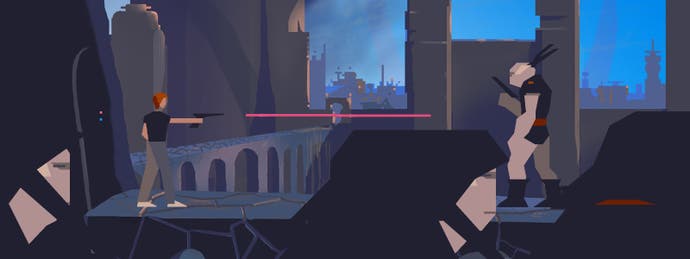
Looking back at Chahi's work across the 80s, it's incredible how prolific he was, and how broad his output was, from gritty platformer Infernal Runner through to text adventures like La Pacte - it's sometimes hard to find a thread through Chahi's 80s work beyond his thirst for something different. "I think I'm a masochist, putting myself in this situation! It would be easy to stick to a style you know that works, to be more secure. I will do another one, two, three, four, five. It's not always easy to do this, but it's more comfortable, I think."
It was in the difficult transition between 8-bit and 16-bit computing that Chahi's work found a larger audience, even if he had some trouble getting there. "There was a time I got lost, because the computers were much better, but I felt I can't do the correct graphics, the correct programming with learning C language, and I got lost. At that time, I focussed only on graphics for two years. It was just after Le Pacte, and I'd just written Profanation - a bad game.
"I was starting to live professionally from games, and it went wrong at that time. It was difficult, so I accepted a salaried post to work on Voyage au Centre de la Terre and Jeanne d'Arc, doing graphics but no programming. And then I had an opportunity to work with Paul Cuisset on Future Wars, and that was a great time. I improved my graphics and animation abilities to the point where it was very fluent. And secondly I focussed, one more time, on coding. It brought me to Another World - I could master the two aspects."
Another World is still Chahi's most famous game, and it remains his personal favourite. Perhaps it's because it's such a personal game - the 1991 platformer was created almost entirely by Chahi himself. "It was very hard to work alone two years on it. Because the transition from the game I made before to this, the way I look at creation, it's a big transition. Because I made it alone, I'm very proud of it. It's coming from the gut!"
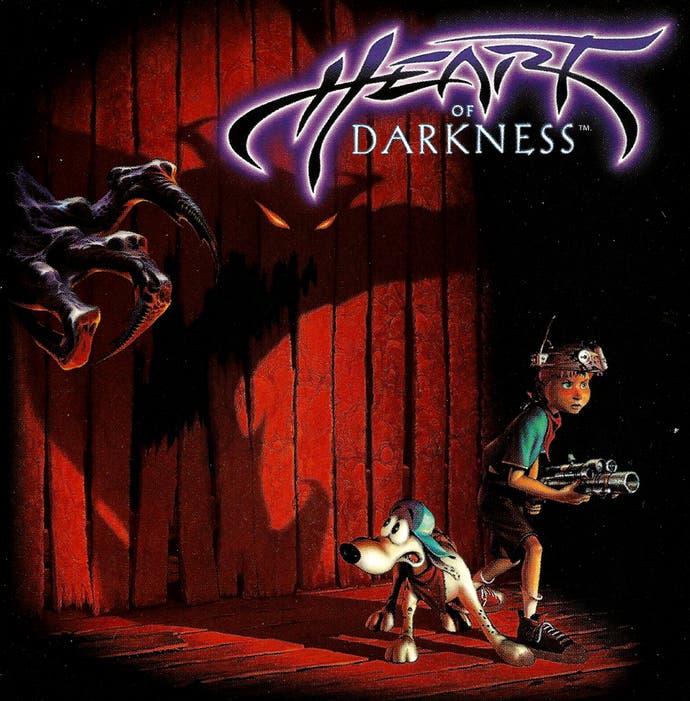
Well over 20 years after its release, Another World's beauty hasn't been dimmed by age. Folding in Chahi's love of fantasy and sci-fi, blending inspirations such as John Carpenter, Star Wars and the art of Richard Corben, its stirring alien surrealism left an imprint seen later in games such as Half-Life, and I think you can still see it today in the rich universe of No Man's Sky ("I've seen this project," say Chahi, "and it strikes me as something very interesting.")
Following the success of Another World, Chahi set up his own development team, Amazing Studio, though the project would prove to be troublesome. "Heart of Darkness was one of the most difficult projects. It was long. It was much longer than expected. It ended well, but it was hard. The switch from working alone to working with a team in the context where the industry was really changing with the CD-Rom coming, the PC and with 3D arriving. I took a step back - I needed to take a rest. I didn't feel like I was matching the industry where projects were bigger and bigger and bigger. I was not seeing the creativity in continuing a big studio."
Eric Chahi started his career surrounded by like-minded independent developers who flourished in the personal computer space throughout the 80s - he was, in many ways, one of the original indies. As video games swelled in the late 90s he didn't see a place for himself, or for his vision. "That was a time where you felt you couldn't make a 2D game! I remember when Heart of Darkness was released, some people were criticising that the game was in 2D. Today you can release a 2D game in very low resolution, and it's not an issue at all! There is a realism wall, and the game industry broke that wall between 2000-2006, where finally you can have 2D games, if the game is good. It shows an evolution between the developer and the public."
13 years would pass between Heart of Darkness and Chahi's next game, the new wave of independent developers inspiring him to make a comeback. "The rise of the indie," says Chahi, "made me more confident." From Dust, released by Ubisoft in 2011, took the love of volcanology that Chahi acquired during his extended sabbatical and siphoned it into what, Populous creator Peter Molyneux once said, was the first real god game; a strategy game full of fire, brimstone and playfulness.
And since then? Chahi might have shied away once more from commercial projects, but he's still been working away, most recently on what can be seen as a hardcore sequel to From Dust, a volcano simulator that's currently installed in a museum on the island of Réunion. "The last two years I worked with another coder, a programmer, to create a simulation," says Chahi. "It's very exciting! At the museum it's playable, but it's only playable there. It's not downloadable, and it's a site specific thing. Maybe we'll use it for something else, but it has its own engine, so it's not very compatible with all the operating systems."
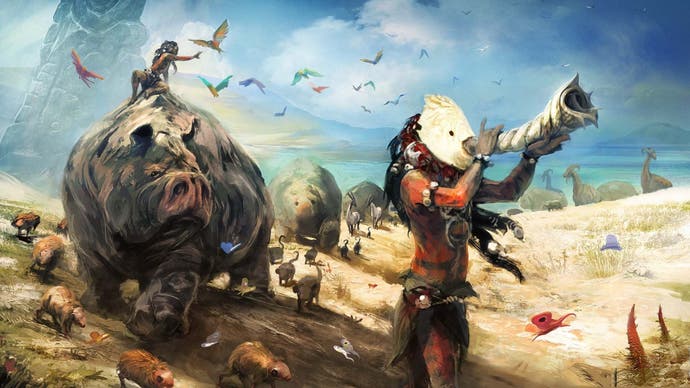
It's a very accurate simulation too, apparently: Chahi points out with a chuckle that the recent eruptions at Piton de la Fournaise were predicted by his simulator. Next for Chahi, he says, is a return to more commercial work, and the prospect of another Chahi game. "Now it's finished, I've switched to a game project. At the beginning of next year I'm starting to build a new team, a small team, to create a new project."
What will it be? There's a loose, brilliantly high-minded concept - "It's probably life," he says when I ask him what it'll be about, "the motion of life" - but beyond that there's little to share right now. "I just want to build some basis on how to create the game. I want to still work with procedural and dynamic things, but precisely what I don't know. I'm excited to explore some VR stuff too."
Chahi's a recent convert to VR, having experimented with it in his museum simulation, and having watched with interest the more recent innovations. "With Vive, it was another level," he says, his enthusiasm going up a notch. "The ability to move in a place, in a virtual place, and interacting with things, that was just amazing. I was like a kid. I had the same feeling that I had when I discovered for the first time some pixels moving on the screen - 'wow you can move on a TV screen these pixels', now I'm like 'wow, you can move around in a virtual space!' It's a new area of exploration, there's everything to discover and to build. And I love exploring. I'm an explorer!"
It's probably the most apt description of this most inquisitive of developers, a man who's currently at the other end of the world observing with glee an active volcano. What a joy it is to have him back making video games. I can't wait to see what this intrepid explorer discovers next.
Welcome to Another World, a translation of Pix 'n Love's recent book on Eric Chahi, is currently seeking support on Kickstarter.
